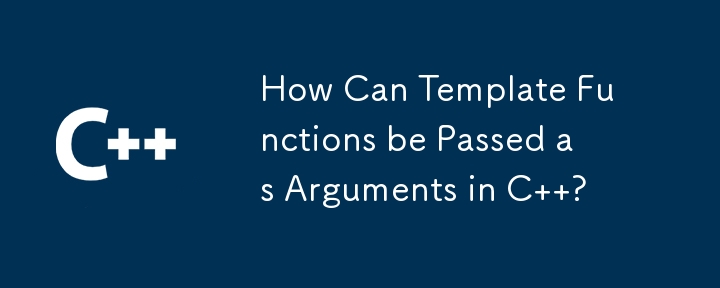How Can Template Functions be Passed as Arguments in C ?
Nov 02, 2024 pm 01:10 PM
Template Function as a Template Argument Explained
In C , generic programming can be achieved using function pointers or templates. Templates offer efficiency as they allow the compiler to inline functions, leading to better performance.
Consider a scenario where two functions, a and b, perform similar operations but with slight variations. To avoid code duplication, a generic function can be defined using templates:
<code class="c++">template<void (*param)(int)>
void function() {
param(123);
param(456);
}</code>This template takes a function pointer as an argument, allowing for runtime selection of the specific function to be executed. In the example, function<> can be called with either a or b as the argument.
Template Functions with Template Arguments
However, limitations arise when a and b are themselves generic functions. Template parameters can be types, template types, or values, none of which directly support passing template functions as arguments.
To overcome this challenge, one can employ "template template parameters." However, using a template function as a type requires instantiation, making it impractical. A workaround involves using dummy structures:
<code class="c++">struct a { static void foo () {}; };
struct b { static void foo () {}; };
template <template <typename P> class T>
void function ()
{
T<SomeObj>::foo ();
T<SomeOtherObj>::foo ();
}
int main ()
{
function<a>();
function<b>();
}</code>In this example, a and b are encapsulated as static member functions within structs. function<T> takes a template struct as an argument, essentially representing the template function to be invoked. By passing this struct, the specific foo function can be executed for different types.
Therefore, this approach allows for defining generic functions that can accept template functions as arguments, enabling flexible and reusable code in C generics.
The above is the detailed content of How Can Template Functions be Passed as Arguments in C ?. For more information, please follow other related articles on the PHP Chinese website!

Hot Article

Hot tools Tags

Hot Article

Hot Article Tags

Notepad++7.3.1
Easy-to-use and free code editor

SublimeText3 Chinese version
Chinese version, very easy to use

Zend Studio 13.0.1
Powerful PHP integrated development environment

Dreamweaver CS6
Visual web development tools

SublimeText3 Mac version
God-level code editing software (SublimeText3)

Hot Topics
 C language function format letter case conversion steps
Mar 03, 2025 pm 05:53 PM
C language function format letter case conversion steps
Mar 03, 2025 pm 05:53 PM
C language function format letter case conversion steps
 What are the types of values returned by c language functions? What determines the return value?
Mar 03, 2025 pm 05:52 PM
What are the types of values returned by c language functions? What determines the return value?
Mar 03, 2025 pm 05:52 PM
What are the types of values returned by c language functions? What determines the return value?
 What are the definitions and calling rules of c language functions and what are the
Mar 03, 2025 pm 05:53 PM
What are the definitions and calling rules of c language functions and what are the
Mar 03, 2025 pm 05:53 PM
What are the definitions and calling rules of c language functions and what are the
 How does the C Standard Template Library (STL) work?
Mar 12, 2025 pm 04:50 PM
How does the C Standard Template Library (STL) work?
Mar 12, 2025 pm 04:50 PM
How does the C Standard Template Library (STL) work?
 Where is the return value of the c language function stored in memory?
Mar 03, 2025 pm 05:51 PM
Where is the return value of the c language function stored in memory?
Mar 03, 2025 pm 05:51 PM
Where is the return value of the c language function stored in memory?
 How do I use algorithms from the STL (sort, find, transform, etc.) efficiently?
Mar 12, 2025 pm 04:52 PM
How do I use algorithms from the STL (sort, find, transform, etc.) efficiently?
Mar 12, 2025 pm 04:52 PM
How do I use algorithms from the STL (sort, find, transform, etc.) efficiently?









